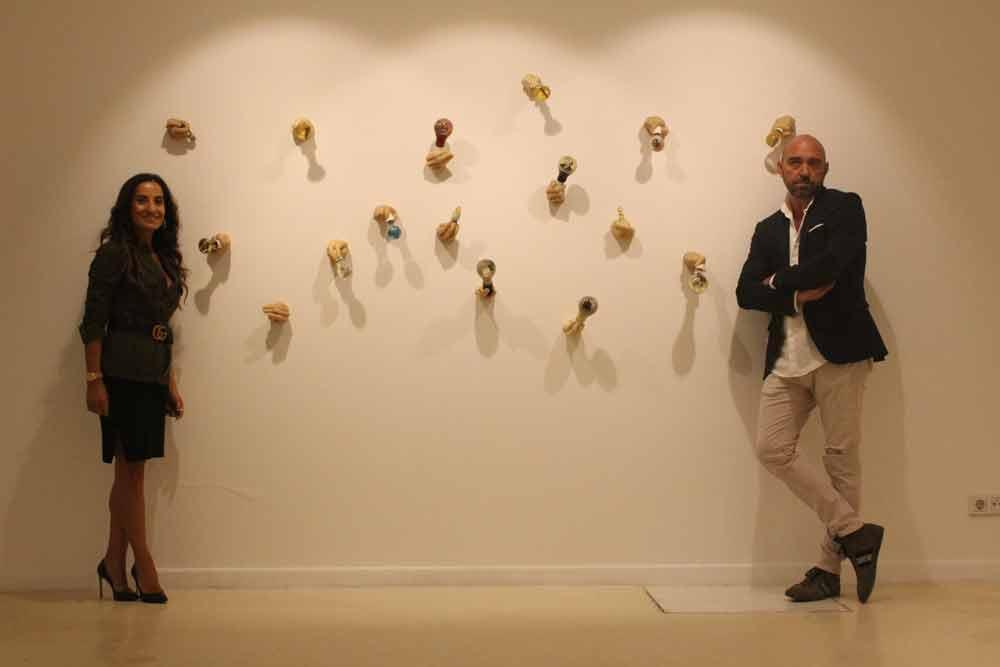
Lido Rico and Berrin Aida Akmanlar Kerpiç
The Spanish artist Lido Rico likes to work with the influence of his ideas and memories. He creates his works reflecting his ideas and the things he remembers from his own life to connect with the audience.
Every single piece he creates holds the trace of his memory. The artist wants the viewer to think about themselves while re-experiencing his own memories. His works, currently showcasing at the Ren Art Gallery in Istanbul, also encapsulates memory, time, existentialism and the struggle of human beings.
According to Rico, the art works he creates is only about humans and how modern times affect them. He aims to show the viewer their lives through his own experiences.
His works follow each other, just like one idea after another. The art works complement each other, and each work has an emotional aspect. All his works are influenced by his own personal experiences and are tied together.
Rico believes the body of a human being is fragile, but what is concrete and real is the mind itself, which is what makes everything. “Body is ephemeral but mind is here to stay forever and make us create things,” he said.
Rico always uses his own figure in his works. He is known mostly for his sculpture paintings, calling it “escultopintura,” a blend of sculpture and painting. He aims to reflect human beings’ internal agony on his works. When Rico produces works, he creates his own sculpture first. It is possible to see his hands, feet and face in his sculptures.
In his creations he aims to show the viewer two things: One is every work he creates is a part of him and his own experience, and the other is that he works with certain ideas, which are formative in his creations.
“I also transmit emotion to the material I use. When the viewer sees one of my works, they feel something, and that’s important for me,” Rico said.
Rico always chases memories and the feelings he has experienced in time. Light bulbs he has created are a proof of this approach. Each light bulb represents his memories and what he thinks and lives in that moment.
Rico deals with the contemporary issues of human life: Fragility, ideas, memories, the individuality of human beings and the pain they feel.
Even though he uses his own experiences, he believes that it resonates with many people. Art is not a monopoly, he believes, it belongs to many people.
You can only change a man through experience and the things he has seen as an individual, according to him.
Some of Rico’s works can be seen in different figures such as skulls. “The skulls also mean life and refer to human beings,” he said, adding that these works are also about the existing agony of human beings.
“My works are always referring to life itself, how human beings live and how they express themselves,” he said.
International artists in Turkish art scene
According to the owner of Ren Art Gallery, Berrin Aida Akmanlar Kerpiç, Rico’s works reflect the reality of life. She aims to encourage Turkish collectors to discover world-renowned new artists.
She founded the gallery in 2011, with aims to serve a mission. Her mission is to not only encourage artists present their paintings, sculptures, photographs and ceramics but also their installations, videos and performances. Now, she discovers completely new areas with consultancies and aims to carry Turkish art to an international scene.
“The idea of opening an exhibition did not satisfy me anymore. I have started to work abroad and I had the chance to know institutions, groups, galleries and artists, and I have decided to carry my knowledge to a further point,” she said.
That’s how she also started to provide consultancy.
‘‘I know many people who are not satisfied with the art works they bought in the past,” she said.
Speaking about the latest developments in the Turkish art scene, Kerpiç said there are many Turkey-based galleries that have opened their second branches abroad.
“I do appreciate their efforts,” she said, adding that it is really important to have a solid background in the art scene to support Turkish artists.
“However, one has to know that this is a long-time project and nothing can happen with a sudden change.”
According to her, we need to see more Turkish artists in the international scene. Kerpiç is also an expert on Middle Eastern art. She has taken part in many exhibitions in the region, and is familiar with leading art figures.